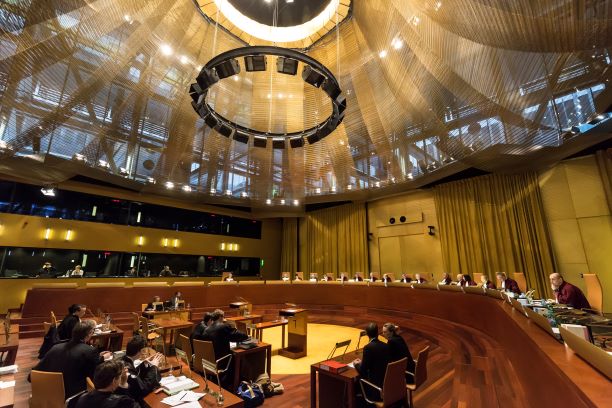The recent ruling by the European Court of Justice (ECJ) in favour of a Flemish ban on ritual slaughter without stunning was welcomed by animal welfare organisations but sparked protests among defenders of freedom of religion in the EU.
Among Jewish and Muslim communities, the ruling was seen as an expression of hypocrisy since stunning does not always work painlessly and inevitably causes suffering to many of the 9 billion animals that are slaughtered annually in Europe. Furthermore, wild meat from hunting, which the court allowed for “cultural” reasons, is also sold on the meat food market. Bull fighting is still allowed.
It did not come as a surprise that animal welfare NGOs welcomed the ruling. “The court’s ruling reflects the increasing importance of animal welfare for European citizens and the intent to minimize suffering at slaughter. There is overwhelming scientific evidence that animals suffer at slaughter if not properly stunned,” commented Olga Kikou, Head of Compassion in World Farming - EU.
“This fact is exacerbated even more if we consider the immense number of animals slaughtered in Europe, close to 9 billion annually.”
But NGOs are also, or even more, worried about factory farming, caging of animals, conditions in slaughter houses, live animal transports, farming of animals for furs, and wet markets, to just mention some examples.
Some animal welfare advocates told The Brussels Times that they have become vegetarians or vegans because of all the suffering caused to animals on the farm and during transport and slaughter. Many believe that no slaughtering of animals, irrespective of method, is acceptable.
The ruling united Israel and the Muslim world and was heavily criticized for sending the wrong signal as antisemitism and islamophobia are growing in Europe. It reminded many about the darkest periods in Europe’s history when ritual slaughter (shechita) was totally forbidden in countries occupied by Nazi-Germany.
In some of the EU member states where stunning in ritual slaughter is required today – Denmark, Greece, Luxembourg, Malta, Slovenia, Finland and Sweden – the legislation dates back to the 30-ties and was inspired by antisemitism. Today, it is also influenced by islamophobia considering the millions of Muslim immigrants in the EU.
The court tried to ensure the Jewish and Muslim communities that they will not lack meat slaughtered according to their rites since the EU regulation it was asked to interpret explicitly forbids bans on such meat exported from member states where slaughter without stunning is allowed.
However, by extending the discretion given to member states to decide on further animal welfare measures, including stunning prior to slaughter, it appears to have gone a step too far from a legal point of view and overinterpreted the regulation, which clearly makes a derogation for ritual slaughter. There is nothing now to prevent other member states to ban slaughter without stunning.
The controversial ruling also contradicts a previous opinion of its Advocate General who had recognized that a ban on ritual slaughter without stunning is an infringement on the rights of Belgian citizens to practice their religions freely and is incompatible with current EU law. In the majority of cases, the ECJ adheres to his opinion but not in this case, without even explaining why.
Loophole in EU regulation
Where does the European Commission stand in this ruling, which happened to be issued shortly after the Commission and the Council decided to step up EU’s fight against antisemitism in the EU?
Asked by The Brussels Times, a Commission spokesperson confirmed that current EU regulation protects ritual slaughtering without stunning by giving the possibility to member states to introduce or maintain legal provisions allowing ritual slaughtering.
That said, and in line with the court ruling, member states may (but are not obliged to) introduce legal provisions which are more favourable to animal welfare, in particular by introducing methods such as 'reversible stunning'.
“It is not for the Commission to agree or not with an ECJ ruling. Judgments by the Court are of course binding,” the spokesperson said.
Recital 18 of the EU regulation on slaughter states that “it is important that derogation from stunning animals prior to slaughter should be maintained, leaving, however, a certain level of subsidiarity to each Member State”. In article 4 it states clearly that the requirement of stunning shall not apply in ritual slaughter “provided that the slaughter takes place in a slaughterhouse.”
However, the loophole in the regulation in article 26 supporting the court’s interpretation states that member states may adopt “national rules aimed at ensuring more extensive protection of animals at the time of killing”, not only for those killed outside a slaughterhouse but also those slaughtered according to religious rites in a slaughterhouse.
The spokesperson declined to say if the Commission will consider to amend the regulation to protect ritual slaughter without stunning.
“We have a full understanding of the concerns of the Jewish and Muslim communities brought by the judgement. We remain always open to discuss the concerns with the Jewish and Muslim communities. The Commission will meet with the Jewish community in early 2021 to discuss those concerns and the freedom of religion of Jewish believers.”
The court referred to scientific data which the Belgian authorities had provided. Has the Commission looked at such data and assessed them in any recent report? According to the Commission, the European Food Safety authority (EFSA) is always consulted in relation to the updating of any scientific information concerning animal welfare.
“The Commission will continue to analyse the opinions produced by EFSA and to ensure proper follow up. In the specific case related to slaughter without stunning no particular reports have been published by the Commission recently.”
M. Apelblat
The Brussels Times

